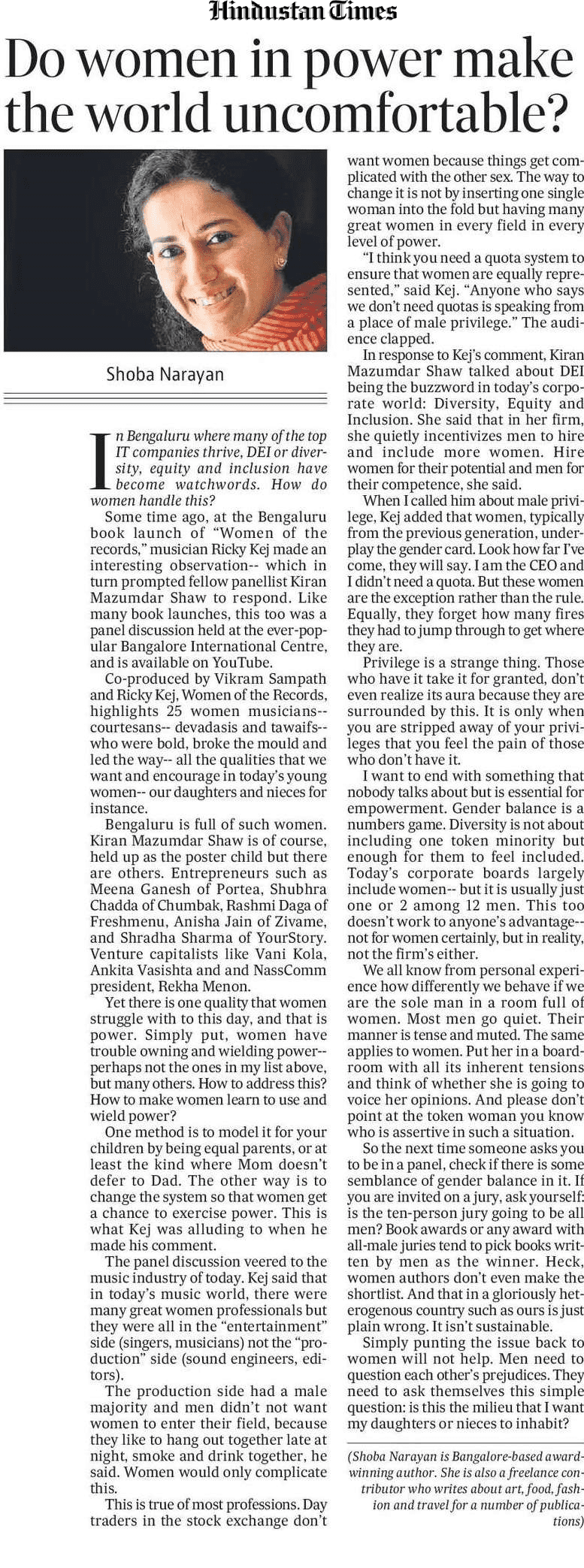Bangalore Talkies: Do women in power make you uncomfortable?
Updated on Nov 18, 2021 01:03 AM IST
![]()
In Bangalore where many of the top IT companies thrive, DEI or diversity, equity and inclusion have become watchwords. How do women handle this?
Some time ago, at the Bangalore book launch of “Women of the records,” musician Ricky Kej made an interesting observation– which in turn prompted fellow panelist Kiran Mazumdar Shaw to respond. Like many book launches, this too was a panel discussion held at the ever-popular Bangalore International Centre, and is available on Youtube.
Co-produced by Vikram Sampath and Ricky Kej, Women of the Records, highlights 25 women musicians– courtesans– devadasis and tawaifs– who were bold, broke the mould and led the way– all the qualities that we want and encourage in today’s young women– our daughters and nieces for instance.
Bangalore is full of such women. Kiran Mazumdar Shaw is of course, held up as the poster child but there are others. Entrepreneurs such as Meena Ganesh of Portea, Shubhra Chadda of Chumbak, Rashmi Daga of Freshmenu, Anisha Jain of Zivame, and Shradha Sharma of YourStory. Venture capitalists like Vani Kola, Ankita Vasishta and and NassComm president, Rekha Menon.
Yet there is one quality that women struggle with to this day, and that is power. Simply put, women have trouble owning and wielding power– perhaps not the ones in my list above, but many others. How to address this? How to make women learn to use and wield power? One method is to model it for your children by being equal parents, or at least the kind where Mom doesn’t defer to Dad. The other way is to change the system so that women get a chance to exercise power. This is what Kej was alluding to when he made his comment.

The panel discussion veered to the music industry of today. Kej said that in today’s music world, there were a great many women professionals but they were all in the “entertainment” side (singers, musicians) not the “production” side (sound engineers, editors). The production side had a male majority and men didn’t not want women to enter their field, because they liked to hang out together late at night, smoke and drink together, he said. Women would only complicate this.
This is true of most professions. Day traders in the stock exchange don’t want women because things get complicated with the other sex. The way to change it is not by inserting one single woman into the fold but having a great many women in every field in every level of power.
“I think you need a quota system to ensure that women are equally represented,” said Kej. “Anyone who says we don’t need quotas is speaking from a place of male privilege.” The audience clapped.
In response to Kej’s comment, Kiran Mazumdar Shaw talked about DEI being the buzzword in today’s corporate world: Diversity, Equity and Inclusion. She said that in her firm, she quietly incentivizes men to hire and include more women. Hire women for their potential and men for their competence, she said.
When I called him about male privilege, Kej added that women, typically from the previous generation, underplay the gender card. Look how far I’ve come, they will say. I am the CEO and I didn’t need a quota. But these women are the exception rather than the rule. Equally, they forget how many fires they had to jump through to get where they are.
Privilege is a strange thing. Those who have it take it for granted, don’t even realize its aura because they are surrounded by this. It is only when you are stripped away of your privileges that you feel the pain of those who don’t have it.
I want to end with something that nobody talks about but is essential for empowerment. Gender balance is a numbers game. Diversity is not about including one token minority but enough for them to feel included. Today’s corporate boards largely include women– but it is usually just one or 2 among 12 men. This too doesn’t work to anyone’s advantage– not the woman’s certainly, but in reality, not the firm’s either.
We all know from personal experience how differently we behave if we are the sole man in a room full of women. Most men go quiet. Their manner is tense and muted. The same applies to women. Put her in a board-room with all its inherent tensions and think of whether she is going to voice her opinions. And please don’t point at the token woman you know who is assertive in such a situation.
So the next time someone asks you to be in a panel, check if there is some semblance of gender balance in it. If you are invited on a jury, ask yourself: is the ten-person jury going to be all men? Book awards or any award with all-male juries tend to pick books written by men as the winner. Heck, women authors don’t even make the shortlist. And that in a gloriously heterogenous country such as ours is just plain wrong. It isn’t sustainable.
Simply punting the issue back to women will not help. Men need to question each other’s prejudices. They need to ask themselves this simple question: is this the milieu that I want my daughters or nieces to inhabit.




Leave A Comment